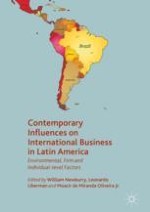Drawing on the best contributions from the 2015 and 2016 Academy of International Business Latin America Chapter (AIB-LAT) conferences, this collection provides analysis and research into the intertwined managerial environments from this vast and complex region. By systematically highlighting environmental, firm and individual-level influences on international business activities, the authors aim to divide the complex nature of this phenomenon into manageable pieces while simultaneously providing an understandable overview of important international business factors in the region. The book invites readers to think critically about how factors at any particular level can only provide one piece of the overall internationalization puzzle in the region.
